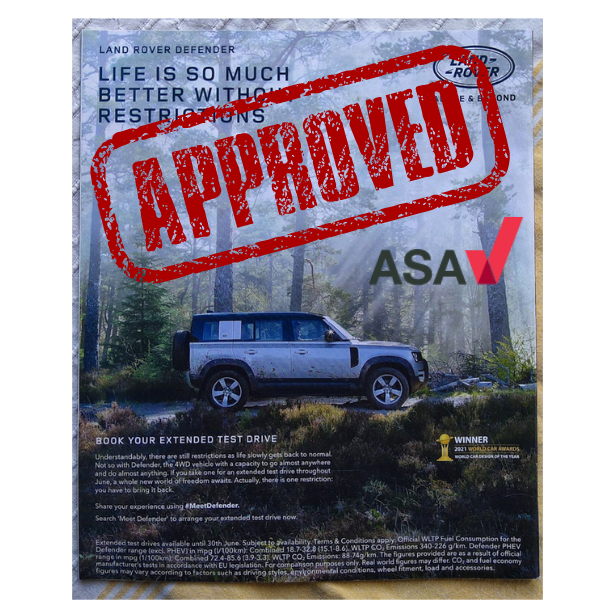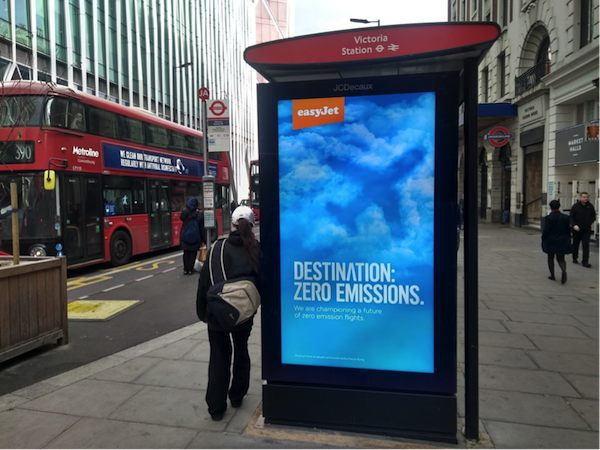Advertising regulator's repeated failures questions its role
Above: ASA's Council overturned a draft ruling
deeming ad to be “socially irresponsbile”
After promising to take better account of greenwash and environmental issues, the UK’s regulator, the Advertising Standards Authority has fallen at the first hurdle following the Glasgow COP26 climate summit.
A series of failed and missed opportunities to hold advertisers to account on key green issues, coupled with a weak track record of action, and being compromised by its overly close links to the industry it is meant to regulate, means the Advertising Standards Authority (ASA) looks not fit for its designated purpose.
In both the approach to the climate conference and since there has been a succession of failures to properly investigate, evasive and poorly argued decisions over environmentally damaging adverts, and ASA Council members going against the advice of its own officers.
A recent report by Adfree Cities found that only 22% of adverts complained about are investigated by the ASA, and only 2% of complaints are upheld, often by which time the advertising campaign is over and the rulings therefore having no material effect. New and recent examples highlighted include:
A failure to investigate adverts containing misleading environmental claims about offsetting – dubbed ‘greenwash’ – and placed in the run up to the COP26 climate summit by the airline EasyJet – the reason given being that an internal policy process made it inappropriate to engage in a routine investigation into the ad.
A failure to investigate adverts containing greenwash claims placed during the recent European Football Championships by airline Qatar Airways – and the fact that those attempting to lodge complaints were instead directed by the ASA to the broadcasting regulator Ofcom – who then told complainants to go back to the ASA.
A failure to follow up on complaints about misleading greenwash in adverts appearing in the UK made to promote oil company Chevron, with complainants instead directed to the regulator in the USA.
Above: Despite receiving complaints against easyJet’s “Destination Zero Emissions” ads in the run up to COP26, the ASA did not launch a formal investigation into the ads..
But now the ASA council has failed to follow the advice of its own officers over complaints related to an advert made by the controversial promoter of large, heavily polluting SUV type cars, Jaguar Land Rover. Land Rover vehicles feature prominently among the class of heavily polluting medium to large sized SUVs on UK roads.
The ASA received 96 complaints against an advert for the Land Rover Defender SUV which pictured the vehicle in sunlit forest and bearing the caption, ‘Life is so much better without restrictions.’ Many of the complaints argued that it was irresponsible of the car maker to provoke sentiment against rules for driving and vehicles that are made to protect people and the environment, while selling a large, heavy vehicle whose levels of pollution are 250% above EU targets for an average car.
Complaints also focused on it being irresponsible to promote unrestricted driving in natural areas such as woodland. Copy in the advert said that there was just one restriction to their offer of a test drive, “you have to bring it (the vehicle) back”. It was more explicit in other ways, saying that the vehicle promised a “whole new world of freedom”, “with the capacity to go almost anywhere and do almost anything”. The complaints argued that this was both misleading, because the majority of SUV vehicles end up clogging town and city streets, and harmful, by encouraging driving in areas which could easily be ecologically sensitive.
After agreeing to investigate the advert and reviewing the evidence and different grounds for complaint against its code of conduct, the ASA’s specialist staff produced a draft ruling upholding this aspect of the complaint. It found that “the ad encouraged and condoned the use of a vehicle in a way that was detrimental to ecologically-sensitive environments, and was therefore socially irresponsible.” As a result the regulator concluded that the ad was in breach of its rule on social responsibility.
However, draft rulings are subject to ratification by the ASA Council, which over-ruled the findings of its officers, letting Land Rover off the hook. This happened in spite of the fact that the ASA only recently declared that, ‘ads that encourage unsustainable behaviours or behaviours likely to harm the environment... will require greater regulatory scrutiny.’ The reason given for not upholding the complaint was that the ‘mud splatters’ seen on the vehicles, ‘could be a common feature of vehicles driven in rural areas, and were not necessarily indicative of irresponsible use.’
Sign our petition below to end advertising for SUVs and the most polluting vehicles.
Complaint to the ASA against Qatar Airways’ ad “Fly Greener” at the Euros 2020 results in dead end
The ASA recently claimed that its tick of approval had gone green, but on current evidence a smoking tailpipe or jet engine would seem a more appropriate symbol for the regulator’s ‘green’ efforts. It’s possible to be left wondering how bad an ad has to be before action is taken. Like an insurance company reluctant to pay out, the ASA seems to put most of its energy into finding ever more creative reasons not to act, rather than doing what they were set up to do. In spite of their public statements on the environment, the ASA has neither grasped the severity and immediacy of the problem, nor found ways to put their green rhetoric into policy practice.
Calls are growing for an overhaul of the structure and funding of the ASA in order that it shows less bias towards advertising industry interests. And, with the climate and ecological emergency posing an even greater, systemic risk than smoking, it can’t be long before a tobacco-style ban on advertising for high carbon products such as cars, SUVs, airlines and fossil fuel companies is seen as a logical next step. The EU recently accepted a European Citizens Initiative – the first step of a formal regulatory process - calling for just such a ban.
Complaint to the ASA against Chevron greenwash ad directed to US regulator




